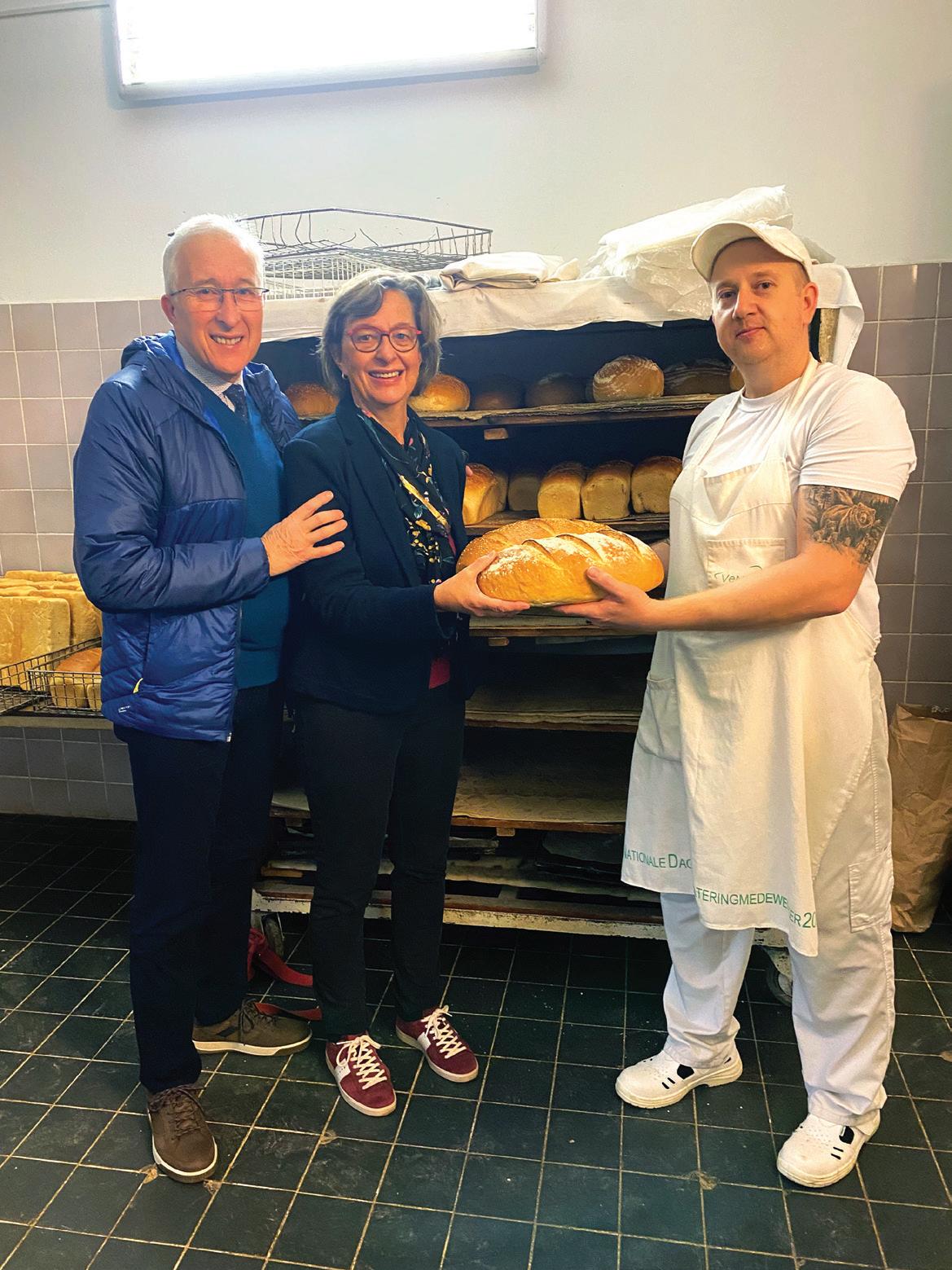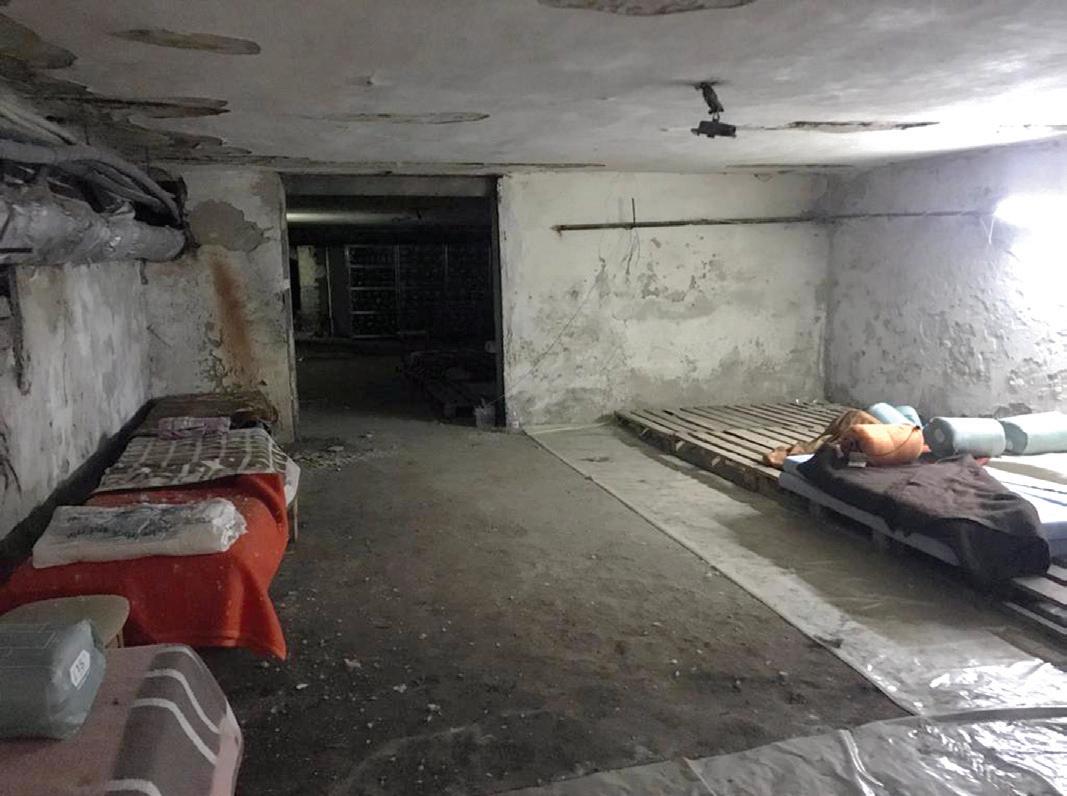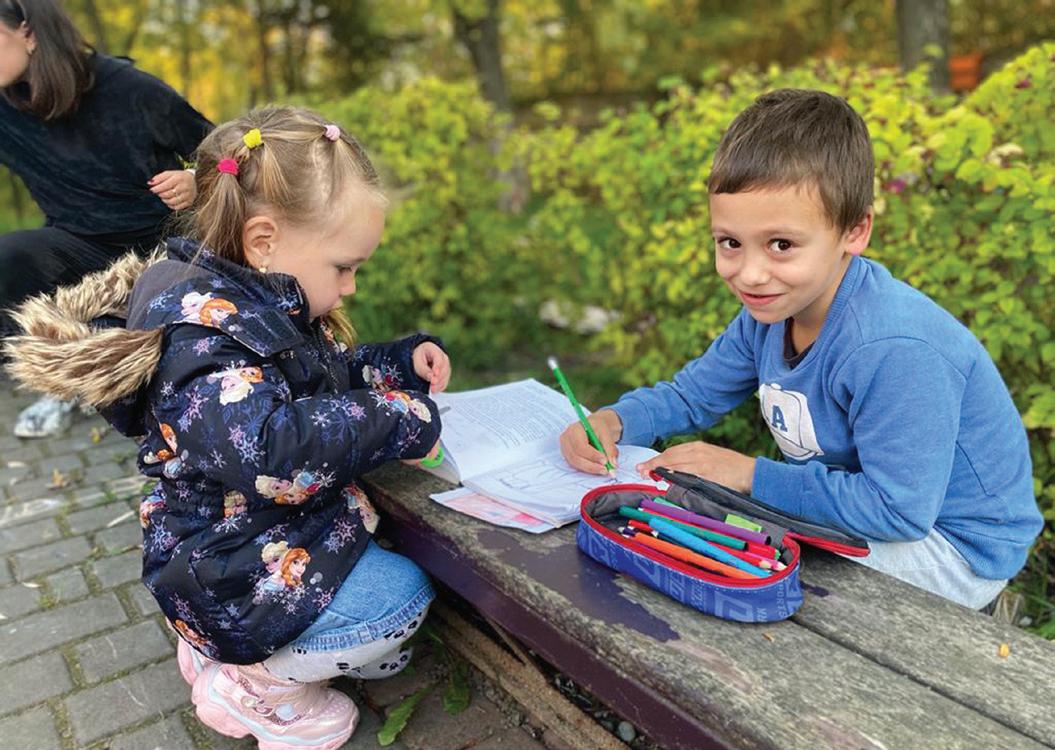
7 minute read
Grace at work
Moderator, Dr John Kirkpatrick, reports on his recent trip to Hungary and Transcarpathia in western Ukraine, to see first hand how PCI donations are helping the refugee crisis.

Sitting here in the quiet peace of my kitchen, it’s difficult to have a true sense of life under fire. Today the news report speaks of 70 missile attacks on Ukraine. In a country of over 200,000 square miles, the ripples of war are felt in ever corner. It was the right thing to respond as we did in February by donating what was the largest gift of its kind from PCI, almost £1.4 million.
In October 2022, Joan and I had the privilege of visiting the western region of Transcarpathian Ukraine, in solidarity with the Reformed Church in Transcarpathia, as they respond to the effects of the war. What we discovered was that all aspects of life have been affected in some way. Many people have left the country in search of safety, causing gaps in the workforce. This means that a greater demand falls on those left behind, especially in terms of social care. Often the elderly and vulnerable are not able to leave.
So as the ripples of war wash on these far western edges of Ukraine, how has the Church responded?
Before I explain that, I need to give a little context to this Church. This region of Ukraine has been the subject of many boundary changes in the last century. The small Reformed Church has found itself under Czech, Hungarian, Nazi, Russian, and Ukrainian control. With each change there have been particular trials for the Church. The worst of these occurred in the period from 1956–1989. During this period, many pastors were exiled to the extremes of the Soviet Union, some to the labour camps. At the conclusion of this time, only a small number of faithful pastors survived and courageously nurtured the Church.
According to Mikhail Gorbachev, the disaster at Chernobyl in 1986 caused the collapse of Soviet communism five years later. The Soviet Union’s last General Secretary described the explosion as a “turning point” that “opened the possibility of much greater freedom of expression, to the point that the system as we knew it could no longer continue.”
Such times can remind us of the greater stories that are being written where the human eye cannot see and the journalist cannot ask questions, nor the camera record. This is a good reminder to us in our present situation in Europe, that what may at first seem only tragic and disastrous is not the complete picture.
The clear and consistent gospel-shaped lives of these faithful pastors was used by God in a special way after the new freedoms… their lives acted as powerful examples of the grace of God. Their ministries produced much fruit, so that today after just 30 years, there is a Church of 67,000 members and 108 congregations, served by 75 pastors and 124 religious teachers. This is a Church moulded in hard times and is well-equipped to minister to the hurting people who are in its midst or passing through.
It is the unremarkable but consistent repetition of simple acts of grace and kindness that define the Church’s response to the overwhelming need. A small bakery, producing thousands of loaves of bread, delivered by bus to Kiev and then filled with children for the return journey. The opening of every church facility to create space for thousands of displaced people. The construction of bomb shelters, the visitation of hundreds of vulnerable people on a regular basis. From donors like PCI, it has been possible to provide over 500,000 tons of food, clothing, hygiene and medical equipment.

The grace of God is seen to be at work in so many ordinary and extraordinary ways. Small gestures of grace have a deep impact. I was moved and challenged by the story of the woman who felt unable to provide a home or something big, but offered to stand in the long border queue for a mother and her children. She offered the gift of rest on the long, tiring journey. Many ‘cups of water’ have been given to honour the Lord and bless others.
While it was true that the streets of Beregszász in Ukraine, where we visited, had few men and the villages had many empty homes, it was also true that there was a great presence of compassion. The churches spread across the countryside were still active and alive, the pastors remaining to serve the community and the displaced people in their midst. As a result of the generosity of PCI, they have been enabled to remain, giving the hopeful grace of presence, as well as ministering to needs.
When I asked Bishop Sandor what he would like us to pray for the country; his response was “peace”. There is no desire for victory, but a peace for all. I was blessed by the response, which goes counter to some of the other voices. He recognises that ordinary people are victims on every side of this conflict and there is need to pray for the Russian people too, to remember that there are believers in Russia who suffer, but have to be mostly silent. His words should resonate with us and guide us in our prayers.
There is a contrast on the other side of the Hungarian border. Everything is ‘life as normal’ on the surface… but later we meet some of the team from Hungarian Church Aid and there we discover that under the ‘waterline’ all is very different. The figures tell their own story. 180,852 refugees have been provided with care in Hungary, by 4,300 volunteers. This is but the tip of a very large iceberg. Involved in this word ‘care’ is the whole journey; from train station to relocation and all the needs required to make that possible each and every day. We can only imagine the weariness and the exhaustion many will feel as they reach out day after day with no clear end in sight.

We witnessed grace at work in the practical and in the emotional support, in the patience and love shown again and again. In Vörösmarty Street, in the midst of the bustling city of Budapest you will find St Columba’s Church, which lives up to its mission statement: “We will nurture one another in faith, uphold one another in prayer, encourage one another in service”. It is here that a small but significant food bank and café now operates to care for Ukrainian refugees. While this is an English speaking church it is clearly communicating grace; working to bless the traumatised and disoriented who are trying to find some semblance of normal life.
I am so aware that our part is the very privileged one. We can leave this behind physically, although we cannot really in our hearts and minds. This is because it is not a story of statistics and facts; it is about people. The people, so traumatised they could not speak to us about their experiences in their Donbas homes. The people each day trying to plan care, ministry, and help in a very changing and unstable world. To visit once is good to identify with and stand with folk on the ground, but it cannot end there.
As I have reflected since, I am more conscious of the other warfare we are all a part of: “For we wrestle not against flesh and blood, but against principalities, against powers, against the rulers of the darkness of this world, against spiritual wickedness in high places” (Ephesians 6:12). This fight has to be won on our knees and in our hearts; these wars shall all cease one day but until then we must fight daily with the might of Christ.


